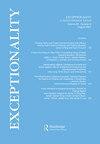Oral Language Contributions to Reading and Writing in Students with and without Language-Learning Disabilities
IF 0.9
4区 教育学
Q4 EDUCATION, SPECIAL
引用次数: 4
Abstract
ABSTRACT Purpose Oral language plays a significant role in the development of reading and writing skills in intermediate grade students. Therefore, it is an important consideration for students receiving special education services for a language-based learning disability (LLD) through the public school system. The goal of this study was to examine the relative contribution of oral language in predicting reading and writing in students with and without LLD. Method An extant dataset including 50 students in fourth and fifth grades was used to answer the study’s research questions. Participants completed a standardized assessment of oral language and reading, and produced one narrative and one expository writing sample counterbalanced across days. Results Significant differences were observed between groups across all measures of oral language, reading, and writing. Oral language accounted for significant amounts of variance in predicting both reading and writing across the sample, with differing patterns by modality. Conclusion Findings from this study contribute to the research knowledge base on intermediate grade students with and without LLD and provide insights into how age, gender, and oral language contribute to the development of reading and writing.口语对有或无语言学习障碍学生阅读和写作的贡献
摘要目的口语对中学生阅读和写作能力的发展起着重要作用。因此,对于通过公立学校系统接受语言学习障碍特殊教育服务的学生来说,这是一个重要的考虑因素。本研究的目的是检验口语在预测LLD和非LLD学生的阅读和写作方面的相对贡献。方法使用一个包括50名四年级和五年级学生的现有数据集来回答研究的问题。参与者完成了口语和阅读的标准化评估,并制作了一个叙事和一个解释性写作样本,在几天内进行平衡。结果在口语、阅读和写作的所有测量方面,各组之间存在显著差异。口语在预测整个样本的阅读和写作方面有很大的差异,不同模态的模式不同。结论本研究的结果有助于建立有LLD和无LLD的中学生的研究知识库,并深入了解年龄、性别和口语如何促进阅读和写作的发展。
本文章由计算机程序翻译,如有差异,请以英文原文为准。
求助全文
约1分钟内获得全文
求助全文

 求助内容:
求助内容: 应助结果提醒方式:
应助结果提醒方式:


